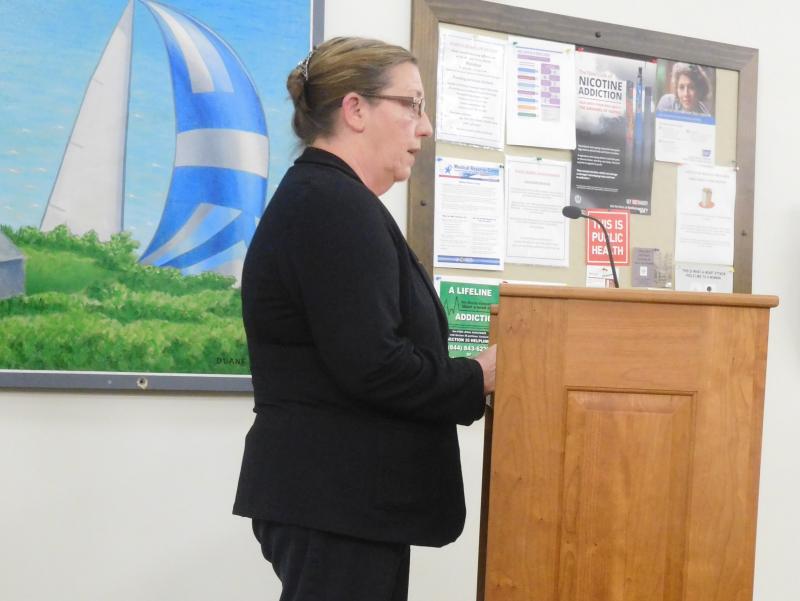Marion Selectmen weigh in on dangerous dog hearing
MARION — Selectmen held a dangerous dog hearing on May 7, ruling that the dog in question should be secured in a safe pen when at home, or on a leash and humanely muzzled when not on its owners’ property. Complicating the issue is the fact that the dog has been voluntarily and permanently relocated to Westfield.
On March 22, Marion residents submitted a citizens petition about a dog attack that occurred on March 3, requesting that Selectmen hold a dangerous dog hearing. The dog in question belonged to Michael and Kate Devoll, and was alleged by neighbors to have attacked a neighbor and her dogs for ten minutes before the attack ceased. On April 20 the owners wrote to the town to inform officials that the dog has been permanently relocated.
Diana Kelley appeared at the hearing as the petitioner. She said the person who was attacked did not feel comfortable attending the hearing.
In telling his version of the alleged attack, Michael Devoll stressed that he was not sure of all of the details.
“I was not at at the outset of the... what I would call a dog fight. I don’t know if it was an attack or a fight. I picked my dog up, there was no further contact between the dogs, and I walked away,” Devoll said, to explain his experience.
Devoll also claimed at the hearing that his dog bite marks on both front paws.
Above all, he stressed that “I want to be good neighbors and good dog owners. The dog is no longer at our home, much to the chagrin of our sad 9 year old boy.”
In recounting her version of the events, Marion’s Animal Control Officer Susan Connor said that two officers and emergency medical services responded. She said that she did not get a chance to talk to the victim, as the woman was being evaluated. She was told that the woman’s husband was en route to emergency vet clinic.
“I was not aware of any injuries [to the Devolls’ dog], and had I been aware of those injuries I would have also quarantined the other dog,” Connor said. Per protocol, she placed the Devolls’ dog under quarantine. “This is the first I’ve heard of those injuries,” she added.
She said she was called twice for quarantine violations, but in one case she was unable to confirm a violation had occurred because she did not see the dog. In a second instance, she judged a quarantine violation had occurred because the Devolls’ son was walking the dog on a leash, but under the terms of quarantine only adults are supposed to walk quarantined dogs.
Devoll countered with “I was in the doorway,” but admitted that “I hadn’t read the quarantine terms as closely as I should have.” He reported that he was upset because he felt that his house was under scrutiny after the first quarantine incident.
Kelley brought up a second attack that she says she discovered in talking to neighbors for the citizens petition.
However, Town Administrator Paul Dawson advised Selectmen that “you really can’t consider this other attack, because it has not been complained of or adjudicated.”
Connor said that she had not received any complaints about the Devolls’ dog prior to the alleged attack. The Selectmen closed the hearing and discussed how to classify the dog.
Selectman John Waterman pointed out that “There’s pretty clear guidance by the state on how to define a dangerous dog, and everyone seems to agree that the dog did, unprovoked, attack another dog.”
Dawson argued that the collie could fit the definition of a dangerous dog, but has also could fit the state definition of a nuisance dog. However, Selectmen agreed that the dog should be judged dangerous. They then asked Connor how the dog’s new location would impact the determination.
She said that if the dog were deemed dangerous the label would follow the dog anywhere in the Commonwealth. She also recommended that the Selectmen find out where the dog is and talk to that Animal Control Officer to inform them of the decision.
Though Selectman Randy Parker pointed out that the dog could return to Marion at any time, Devoll clarified that “we’re not bringing the dog back.”
After looking at the seven options for a dangerous dog, the Selectmen agreed that confining the dog to its home and securely restraining the dog when it is in public should be enough, given what they knew of the circumstances.











